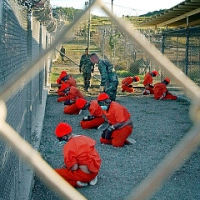Court Rules Judges May Oversee Prison Conditions at Guantánamo, Opening Door to Detainee Lawsuits
 Detainees at Guantánamo Bay prison (photo: McCoy, AP)
Detainees at Guantánamo Bay prison (photo: McCoy, AP)
Guantánamo Bay could become the focus of multiple lawsuits by detainees who have won the right to sue in federal court over the conditions of their confinement.
A three-judge panel of the U.S. Court of Appeals for the District of Columbia has ruled that federal judges can hear complaints by detainees—something the Barack Obama and the George W. Bush administrations as well as Congress have opposed.
The case arose after three detainees filed a lawsuit over their being forced-fed by Guantánamo guards after going on a hunger strike.
The plaintiffs did lose part of their legal battle. The 2-1 ruling stated the prison’s operators had the authority to feed prisoners against their will to keep them alive.
But the decision also said the courts can oversee conditions at the prison as part of habeas corpus lawsuits.
Jon Eisenberg, a lawyer for the prisoners, praised the ruling, calling it a “huge win.”
“This decision establishes that the federal courts have the power to stop the mistreatment of detainees at Guantánamo Bay,” Eisenberg told The New York Times. “The Court of Appeals has given us the green light to continue our challenge to the detainees’ force-feeding as being unconstitutionally abusive. We intend to do that.”
The U.S. Department of Justice, which argued the case for the Obama administration, has yet to announce whether it will appeal the ruling to the full appeals court or the U.S. Supreme Court.
The ruling is the latest in a long-running fight over the Judiciary’s authority regarding Guantánamo.
In 2004, the Supreme Court ruled that courts did have jurisdiction to hear detainees’ lawsuits.
This decision prompted the George W. Bush administration and Congress to adopt a law stating the courts could not mettle in the prison’s affairs.
The Supreme Court ruled again, this time in 2006, saying the new law only applied to future lawsuits by detainees.
Congress came back in 2006 with the Military Commissions Act (pdf), which prohibited the courts from hearing both existing and future lawsuits by detainees.
The Supreme Court refused to back down and ruled in 2008 that detainees could bring habeas corpus lawsuits challenging their detention before federal judges.
-Noel Brinkerhoff
To Learn More:
Appeals Court Allows Challenges by Detainees at Guantánamo Prison (by Charlie Savage, New York Times)
Guantánamo Hunger Strikers Able to Challenge Force-Feeding, Court Rules (by Ed Pilkington, The Guardian)
Opinion of the Court: Shaker Abdurraheem Aamer, Detainee, et al. v. Barack Obama, et al. (U.S. Court of Appeals)
9/11 Suspects Can’t Mention being Tortured during Trial Testimony because Their Torture is Classified (by Matt Bewig, AllGov)
Obama Signs into Law Indefinite Detention of Americans without Trial (by David Wallechinsky and Noel Brinkerhoff, AllGov)
- Top Stories
- Unusual News
- Where is the Money Going?
- Controversies
- U.S. and the World
- Appointments and Resignations
- Latest News
- Trump Offers to Return Alaska to Russia
- Musk and Trump Fire Members of Congress
- Trump Calls for Violent Street Demonstrations Against Himself
- Trump Changes Name of Republican Party
- The 2024 Election By the Numbers






Comments